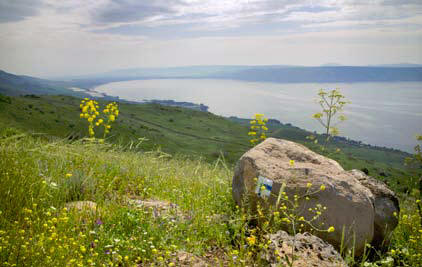The Gospels: I Preached the Sermon on the Mount
Israel. Golan Heights. Syria. Lebanon. These are the modern names of some of the places surrounding Capernaum, the base area from which Jesus Christ ministered almost 2,000 years ago. It’s an area that today—as then—bristles with military tension and the ever-present potential of terrorist activity. Hardly the world of peace Jesus preached about!
It’s not number one on most tourist itineraries, either. Yet here we were, an oddly mixed busload of 28 people from several nations.
“These words of Jesus on this mount are not religious. If only all mankind would listen to them and live by them, the world would have peace.” |
Our cheerful, confident Israeli tour guide, Reuben, had already demonstrated a flare for re-creating the “feel” of historical events in his beloved homeland. A few days earlier, as we looked down from the dizzying heights of the fortress Masada upon the remnants of surrounding Roman encampments, Reuben had excited our imaginations with the impassioned exhortation of the zealous Jewish leader who encouraged 1,000 of his followers to embrace death rather than Roman desecration in a.d. 73.
 The words from Masada live on in local history books, but the wider world has not felt their power. Jesus’ words, on the other hand, rippled across the nearby Sea of Galilee, and across the centuries have communicated an attracting power that draws to Israel many thousands of people from all nations every year, despite the continuing visible presence of military forces prepared for immediate deployment.
The words from Masada live on in local history books, but the wider world has not felt their power. Jesus’ words, on the other hand, rippled across the nearby Sea of Galilee, and across the centuries have communicated an attracting power that draws to Israel many thousands of people from all nations every year, despite the continuing visible presence of military forces prepared for immediate deployment.
After we had climbed the mount by the Lake of Galilee, our guide asked—with an amazing theatrical talent to tease us — if we had ever seen a Jew carrying a New Testament Bible. No? His hand slid into his backpack and withdrew a black leather book.
“These words of Jesus on this mount are not religious,” Reuben stated boldly. “If only all mankind would listen to them and live by them, the world would have peace.”
There was silence on the mount as these words hit our consciences. Standing in a land engulfed for so long by war and violence, we struggled to deal with the impact of Jesus’ vision of peace.
I was standing nearest our guide. He thrust the shiny black book at me. “I want you to read Matthew chapter 5 to us all,” Reuben said. “It will explain why I brought you here.”
I read,
“Blessed are the poor in spirit, for theirs is the kingdom of heaven.
“Blessed are those who mourn, for they will be comforted.
“Blessed are the meek, for they will inherit the earth.
“Blessed are those who hunger and thirst for righteousness, for they will be filled.
“Blessed are the merciful, for they will be shown mercy.
“Blessed are the pure in heart, for they will see God.
“Blessed are the peacemakers, for they will be called the sons of God.
“Blessed are those who are persecuted because of righteousness, for theirs is the kingdom of heaven” (verses 3-10).
These eternal truths floated quietly from the printed page to the hearts of my companions. Our attention was riveted on the simplicity of the message.
Reuben was right. He wants peace for all people. The words of peace I had repeated to a busload of 21st-century tourists had begun to turn the world upside down nearly two millennia ago. They had offered hope to an oppressed people.
They still do when one is bold enough to trust the author of eternal life and let him live from within our hearts.
“Hey, Ken!” called out Stephen, a South African member of our tour group. “I got it all on my tape recorder. They’ll never believe this when they hear it back home—Jesus’ Sermon on the Mount with an Aussie accent!”
Ken Slade lives in Bendigo, Victoria, Australia.
Author: Ken Slade
